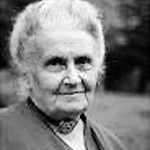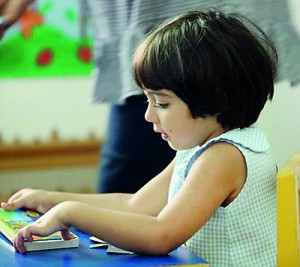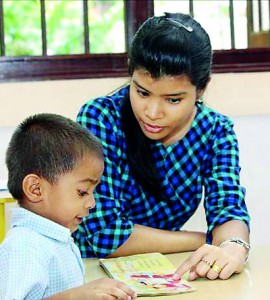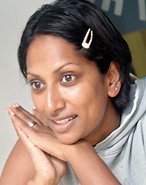Montessori: A unique approach to learning
View(s):The Montessori philosophy founded by Dr. Maria Montessori is fundamentally a method of recognizing children as they really are and of creating an environment which will foster the fulfillment of their highest potential – spiritually, emotionally, physically, and intellectually. Montessori education is characterized by a strong emphasis on independence, freedom within limits, and respect for a child’s natural psychological growth.
Dr. Maria Montessori introduced to the w

"I have studied the child. I have taken what the child has given me and expressed it and that is what is called the Montessori Method." Dr. Maria Montessori.
orld this tried and tested method for bringing forth the best in a child 100 years ago. What is unique about the Montessori Method? The focus on the “whole child”, “prepared environment” and “Montessori materials” make the method different from the many programmes.
Montessori allows each child to reach his/her full potential in all areas of development. Activities in the Montessori environment promote cognitive, physical and social skills. Children are allowed to experience the joy of learning by allowing them to learn at their own pace.
The “prepared environment” allows for self-directed learning to take place. The freedom in the environment permits children to take ownership for their learning thus building positive self concept and confidence.
The Montessori materials are multi-sensory, sequential and self-correcting which facilitates the learning of skills and ideas.
Teaching with the Montessori Method requires skills that differ from traditional teaching. In Montessori schools, a teacher works with children on an individual basis, guiding them and helping them discover their own natural talents.
Montessori teaches adults to be less egocentric and more observant of a child’s growing needs. It enables Montessori teachers to respect individual differences, and to accentuate social interaction and work towards the education of the whole personality of a child rather than the teaching of a specific body of knowledge.
The Montessori methodology is dynamic and relevant because observations and adhering to the needs are continual and specific for each child. When a Montessori teacher meets the physical, mental, spiritual, and emotional needs of the children, satisfaction will set in as the children will exude excitement and a desire to play and work with enthusiasm, to learn, and to create.
The Montessori Method of Education is a model which looks at the needs of children of all levels of mental and physical ability as they live and learn in a natural, mixed-age group which is very much like the society they will live in as adults and hence it will provide children with a seamless transition into different phases of their life.
Today Montessori Education is catching on in increasing numbers around the world, the need for Montessori trained teachers has become a worldwide demand, as such teacher training centers and schools exist on all continents.
Modern Montessori International (London) is a leading provider of the teacher training course and has been in the industry for over 21 years. Their presence spans over the Asia Pacific region, making them the leading Montessori training institute.
The aim of Modern Montessori International (London) is to support students in becoming a trained professional Montessori teacher with a deep insight into the Montessori Method of education and its practice. We believe that training provides a unique and deeply enriching experience.
MMI conducts and promotes Montessori training all over the world. Designed for individuals wishing to work with or teach children from 2.5 to 6 years of age, the Montessori course aims to develop in students a high level of professional competence as certified and qualified practitioners of the Montessori methodology.
Diploma in Montessori Method of Education is an internationally recognized programme endorsed by the British Accreditation Council (BAC) and Open & Distance Learning Quality Council (ODLQC) of the United Kingdom.
The Montessori course is delivered by professional lecturers with the objective to give potential teachers a deep grounding in the Montessori principle and philosophy, a basic understanding of child psychology, an appreciation and understanding of the teaching aids developed by the late Dr. Maria Montessori, a knowledge of the Montessori environment and their role as a Montessori directress/ parent.
The course covers the Montessori Philosophy, child development, curriculum planning and the five areas of teaching, namely Montessori Exercises of Practical Life, Sensorial Education, Language, Phonics & Grammar, Mathematics, and Cultural Subjects such as Geography, Botany, Zoology, and History. The five pillars of the Montessori Education namely are;
During Montessori Practical Life a student of the course will learn to prepare a child for important everyday skills. The potential Directress will then be able to encourage and develop the cognitive development and fine motor skills of a child.
Montessori Sensorial Education exposes a Montessori trainee to the sensorial equipment used in this module, which will enable them to reach out to the child and lay a solid foundation for the child’s learning process by refining and developing their senses.
Montessori Language, Phonics & Grammar will facilitate teachers to understand that communication is the foundation for meaningful development of language concepts and skills. Students will learn language concepts that will enable them to impart knowledge and focus on the child’s four areas of language development; reading, writing, speaking and listening.
Through Montessori Mathematics students will gain an in-depth understanding of mathematical concepts such as arithmetic, geometry, statistics and calculus. Clear, precise and abstract ideas used for relaying these concepts to children will be taught.
Impart appreciation of the world through the Montessori Cultural Subjects, potential Montessori educators will learn activities and be introduced to materials that will enable them to teach the child about the world through Geography, Botany, Zoology and History.
There has been tremendous growth of the Montessori movement in recent years. The numbers of Montessori schools all over the world have doubled. This is an opportune time to be trained as a Montessori teacher.
The Montessori preschool industry is widely considered to be “recession proof”. The growth of Montessori in both private and public education, has led to an unprecedented demand for certified Montessori teachers therefore the demand for Montessori teachers will be greater.
To be a trained Montessori teacher you can further it by education through the Diploma in Montessori Method of Education. The course will ensure that as teacher you will learn and acquire the necessary intelligence to build upon experiences and thought processes to impart to the child.
To facilitate the step towards a Montessori career, it is pertinent to receive the right motivation and guidance and the Diploma in Montessori is the way to go, call MMI on 0777 70 10 10 for further information.
www.mmi-srilanka.com
Follow @timesonlinelk
comments powered by Disqus


























